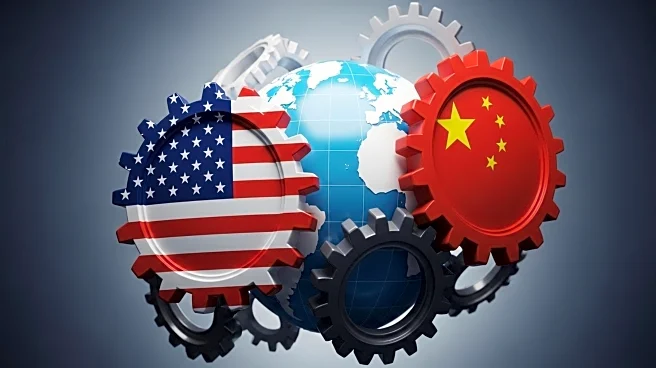What is the story about?
What's Happening?
The Tel Aviv Stock Exchange experienced a downturn as renewed U.S.-China trade tensions affected global markets. The TA-35 index dropped 2% at the open, later trimming losses to 1.3% by midday. Technology stocks led the declines, with the TA-Technology index falling 2.5%. This market reaction followed President Trump's announcement of a 100% tariff hike on Chinese exports. The decision was in response to China's restriction on rare earth mineral exports, which are crucial for global tech manufacturing. Trump's comments also included threats of new export controls on aircraft and parts. The announcement led to significant losses on Wall Street, with the S&P 500 falling 2.7%, the Dow Jones Industrial Average dropping 1.9%, and the Nasdaq sliding 3.6%. Investors shifted to safe-haven assets like gold and U.S. Treasury bonds, while the U.S. dollar weakened against major currencies.
Why It's Important?
The escalation in trade tensions between the U.S. and China has significant implications for global markets, particularly the technology sector. Rare earth minerals are essential for manufacturing tech products, and China's export restrictions could disrupt supply chains, affecting production costs and availability. The tariff hike by President Trump may lead to increased prices for consumers and businesses relying on Chinese imports. The market volatility reflects investor concerns about the potential for a prolonged trade conflict, which could impact economic growth and stability. Companies in the tech industry, which heavily depend on these materials, may face challenges in maintaining their production levels and profitability.
What's Next?
The ongoing trade tensions may prompt further negotiations between the U.S. and China to resolve the issues surrounding rare earth mineral exports. Stakeholders in the tech industry will likely advocate for diplomatic solutions to avoid disruptions in their supply chains. Additionally, investors may continue to seek safe-haven assets as uncertainty persists. The U.S. government might explore alternative sources for rare earth minerals to reduce dependency on Chinese exports. The situation could also lead to broader discussions on trade policies and their impact on global economic relations.
Beyond the Headlines
The trade conflict highlights the strategic importance of rare earth minerals in global technology manufacturing. It raises questions about the sustainability of current supply chains and the need for diversification. The situation may encourage countries to invest in domestic production capabilities or seek partnerships with other nations to secure these critical resources. The geopolitical implications of the trade tensions could influence future international relations and trade agreements, as countries reassess their dependencies and alliances.

















